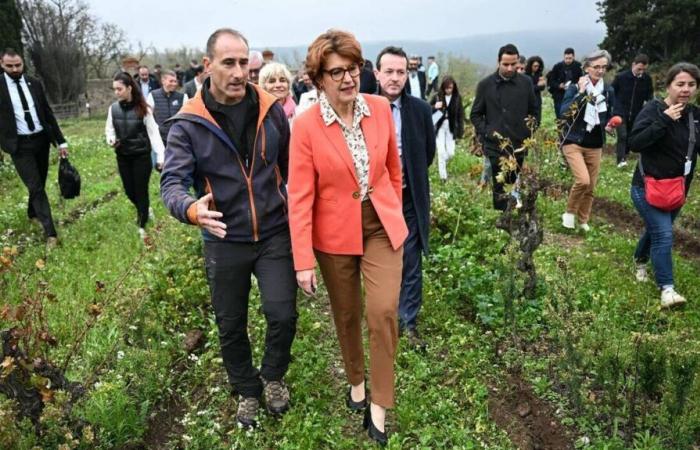The Minister of Agriculture, Annie Genevard, assured ” to understand “ the anger of French farmers faced with drained treasuries and the threat of a Mercosur agreement, but calls not to exceed “the limits of violence”she warned this Tuesday, November 12, 2024 on TF1.
Read also: Mercosur: four questions on the draft treaty which arouses the discontent of French farmers
“No violence”
“This anger, this worry I hear it, I understand it”, assured the Minister of Agriculture, Annie Genevard. “It takes time for the measures to percolate on the ground, they are in the budget, I honored the commitments that had been made by the State and I took other measures because the crisis has intensified in certain territories »she defended, evoking the “single administrative control” annual farms or “state-guaranteed loans”.
Less than a year after the historic agricultural mobilization, the majority alliance in France FNSEA-JA called in the columns of West France to national actions once winter sowing is completed, « from mid-November » but more likely the week of November 18, when the G20 will begin in Brazil, reports theAFP.
“I am a woman of dialogue. There must be no violence against the police, no damage to public property, no disorder as we approach the Christmas holidays which are so important for our traders”called the minister. “There are limits that will have to be set”she warned. “The limit is the violence, the damage, the prevention of the delivery of food to businesses,” she notably listed. “It is important not to break the link between the French and farmers as Christmas approaches.”
On the draft Mercosur agreement which arouses the fear of French farmers, the minister declared: “It is very unlikely that this agreement will be signed at the G20. But of course the threat remains […] We don't want this deal, because it's bad! […] This unfairly competes with our own production, it is made with substances that are banned here and it comes at the cost of deforestation”.
“An agricultural revolt”
The Rural Coordination, the second agricultural union in the country which gained visibility with striking actions last year and some executives of which display their proximity to the extreme right, promises “an agricultural revolt” starting November 19, with a “food freight blockage”.
As for the Peasant Confederation, the 3rd union force and heir to the anti-globalization struggles, it is planning actions against the “free trade agreements” or “land grabbing by energy companies”.
The climate is tense. Added to the bloodless treasuries are the fear of seeing the European Union's free trade agreement with Mercosur (Argentina, Brazil, Uruguay, Paraguay and Bolivia) come to fruition in Rio and the fear of seeing taxes rise at the Chinese borders. and American.
Worst wheat harvest in 40 years
Since the beginning of October, actions have multiplied in the regions: a heifer disembowelled by a wolf left in front of a sub-prefecture in Doubs (east of the country), a funeral wake held at “the memory of French agriculture” in Corrèze (south), chrysanthemums arranged at the foot of a cross symbolizing Vosges breeders abandoned by the Lactalis dairy group… list itAFP.
Starting last year from a thirsty Tarn (south), the mobilization this time has its source in a horribly humid countryside. Due to excess water, France, the leading agricultural power in the European Union, experienced its worst wheat harvest in 40 years in 2024 and saw its harvest fall by a quarter.
From the Pyrenees to the Belgian border, herds of cows and sheep are suffering a wave of devastating epidemics which threaten the fertility of the surviving animals and therefore future production.
“Without a structural response, the crisis has never stopped and it has greatly worsened due to climatic hazards”underlines Laurence Marandola, spokesperson for the Peasant Confederation.
However, since January, the government has increased commitments, released hundreds of millions of euros in aid, put an agricultural orientation law in motion and tackled the administrative millefeuille denounced by farmers.
Despite the State's commitments, the situation is more explosive than last year. Cereal growers have less wheat and will sell it less expensively due to a drop in international prices, breeders have the feeling of a “endless fall”.
The EU-Mercosur agreement, a “scarlet line”
In Haute-Garonne, Jérôme Bayle, figure of last winter's mobilization in the South-West, believes that the signing of the EU-Mercosur agreement will be the element “which will make anger explode”.
At the FNSEA, which defends France's export vocation in wheat and cognac, Arnaud Rousseau calls on Paris to veto this treaty. “It’s a scarlet line”, “an existential fight”he repeated.
At Rural Coordination, Véronique Le Floch warns that if Mercosur came into force, it would not be “no longer worth talking about the agricultural orientation law”because it would become useless to settle young people in a France which would have “designed food sovereignty from imports”.
The Peasant Confederation, which has been fighting against this agreement for years, believes that“no reciprocity measure can ever compensate for massive imports” which would result from it.
In a gloomy economic climate, everyone is advancing their pawns. A union source recognizes a “temptation of one-upmanship” between competing organizations, but also on the side of the political class.
On Sunday, the president of the National Rally (far-right party) Jordan Bardella was welcomed by a historic figure of the Rural Coordination in Lot-et-Garonne (south). He advocated protectionist measures, believing that “the vital prognosis of French agriculture is today engaged”.






